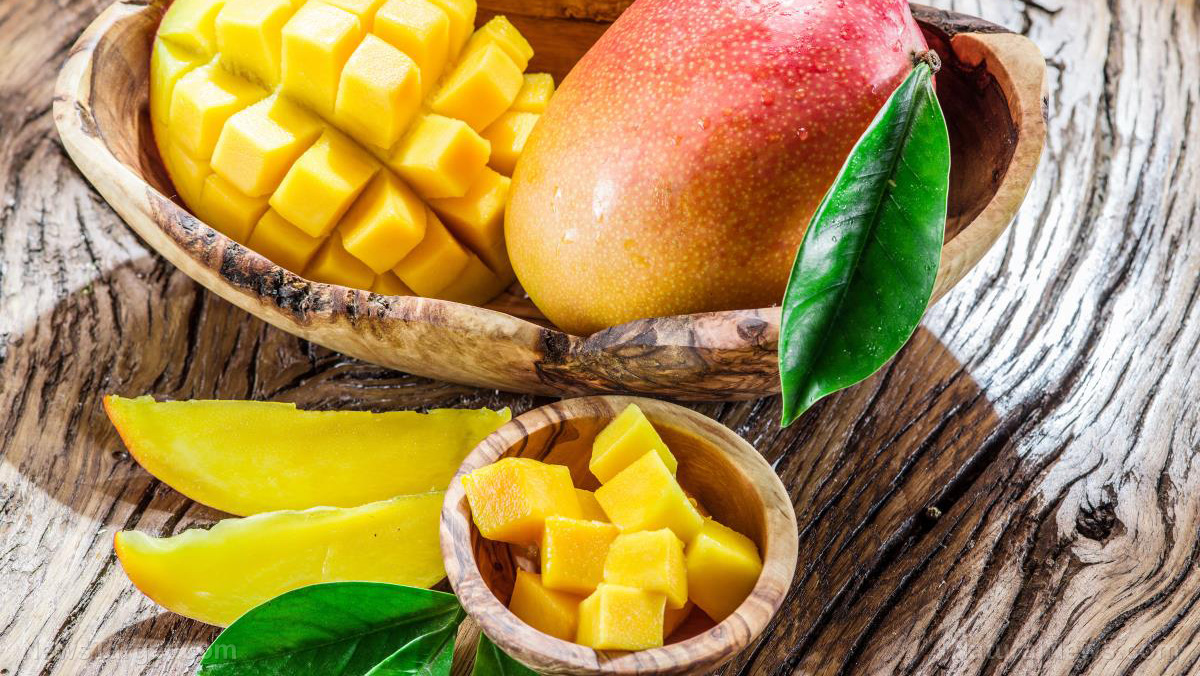Here’s why you should eat more mangoes: 6 Health benefits
08/13/2019 / By Zoey Sky

Mangoes (Mangifera indica) are native to India and Southeast Asia. In certain parts of the world, the sweet and juicy mango is called the “king of fruits” because of its incredible nutritional profile.
Do take note that mangoes are high in sugar. A cup of diced mangoes contains at least 25 g of carbs and 100 calories. However, when consumed in moderation, mangoes provide the following health benefits.
Mangoes strengthen your immune system.
Eating a cup of mango offers at least one-quarter of the daily target for vitamin A.
This vitamin is essential for the proper functioning of your immune system, along with the production and activity of white blood cells. Vitamin A deficiency is linked to greater susceptibility to infections.
Mangoes boost eye health.
Mangoes contain two antioxidants: lutein and zeaxanthin. These compounds are good for your eyes because:
- They protect the retina and lens.
- They reduce the discomfort caused by glare.
- They reduce the time it takes for your eyes to recover from the stress caused by bright lights.
- They help increase visual range.
- They enhance visual contrast.
- They can protect your eyes from harmful UV rays.
- They also help prevent or slow the progression of cataracts and macular degeneration.
Mangoes improve skin and hair health.
Vitamin A in mangoes is also crucial for the development and maintenance of different types of epithelial tissues such as hair, skin, and the sebaceous glands.
The sebaceous glands are attached to hair follicles and they keep your hair moisturized and healthy.
A cup of mango also offers at least 75 percent of the daily minimum vitamin C intake. Your body needs vitamin C to produce collagen, a type of tissue that makes skin elastic. Collagen also prevents wrinkles and sagging.
Mangoes relieve constipation.
A study published in the journal Molecular Nutrition & Food Research, suggested that consuming mangoes could relieve the symptoms of individuals who suffered from chronic constipation, compared to consuming an equal amount of isolated fiber. (Related: Eating a mango every day prevents constipation.)
However, mangoes are a high-FODMAP food that can trigger gas and bloating in certain individuals. If you have irritable bowel syndrome, you should probably avoid mangoes.
Mangoes help fight cancer.
Mangoes contain more than a dozen types of polyphenols. These plant compounds have antioxidant activity that protects cells from DNA damage, reducing your risk of degenerative diseases like Type 2 diabetes and cancer.
Additionally, animal research revealed that antioxidants from mangoes can suppress the growth of breast cancer cells.
Mangoes improve blood sugar.
In a pilot study published in the journal Nutrition and Metabolic Insights, researchers found that mangoes helped improve blood sugar levels.
Researchers from Oklahoma State University observed 20 obese participants who consumed 10 g of ground and freeze-dried mango pulp, which was equivalent to at least half a fresh mango, daily. After 12 weeks, the volunteers had lower blood glucose levels than when the experiment began.
The scientists posited that bioactive components in mangoes, such as antioxidants, could be responsible for the improvement in blood sugar levels.
Mangoes are a versatile fruit and they can be added to both sweet or savory dishes. Add mangoes to avocado toast or plain Greek yogurt for a sweet, nutritious snack. You can also make mango smoothies, or you can add it to salsa, slaw, or garden salads.
Whether you serve mangoes over cooked fish or eat them on their own, these sweet and juicy fruits can provide you with incredible nutritional benefits.
Sources include:
Submit a correction >>
Tagged Under:
anticancer, antioxidants, blood sugar, constipation, diet, digestion, eyes, Fresh, fruits, hair, immune system, mango, Mangoes, organics, phytonutrients, polyphenols, prevention, skin health
This article may contain statements that reflect the opinion of the author
RECENT NEWS & ARTICLES
Antioxidants.News is a fact-based public education website published by Antioxidants News Features, LLC.
All content copyright © 2018 by Antioxidants News Features, LLC.
Contact Us with Tips or Corrections
All trademarks, registered trademarks and servicemarks mentioned on this site are the property of their respective owners.





















